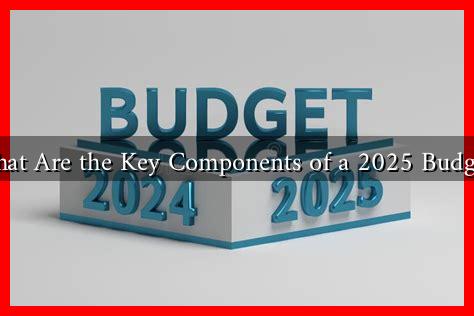-
Table of Contents
What Are the Key Components of a 2025 Budget?
As we approach 2025, the importance of a well-structured budget cannot be overstated. Whether for individuals, businesses, or governments, a budget serves as a financial blueprint that guides spending, saving, and investment decisions. In this article, we will explore the key components of a 2025 budget, providing insights and examples to help you understand how to create an effective financial plan.
Understanding the Importance of Budgeting
Budgeting is essential for several reasons:
- Financial Control: A budget helps track income and expenses, allowing for better financial control.
- Goal Setting: It enables individuals and organizations to set and achieve financial goals.
- Resource Allocation: A budget ensures that resources are allocated efficiently to meet priorities.
- Risk Management: It helps identify potential financial risks and prepares for unforeseen circumstances.
Key Components of a 2025 Budget
Creating a budget for 2025 involves several critical components. Here are the key elements to consider:
1. Income Projections
Estimating your income is the first step in creating a budget. This includes all sources of income, such as:
- Salary and wages
- Investment income
- Rental income
- Side business revenue
For example, if you expect a salary increase or a new job, factor that into your income projections. According to the Bureau of Labor Statistics, the average wage growth is projected to be around 3% annually, which can significantly impact your budget.
2. Fixed and Variable Expenses
Understanding your expenses is crucial for effective budgeting. Expenses can be categorized into two main types:
- Fixed Expenses: These are regular, unchanging costs such as rent, mortgage payments, and insurance premiums.
- Variable Expenses: These fluctuate and include groceries, entertainment, and discretionary spending.
For instance, if your fixed expenses total $2,000 per month and your variable expenses average $800, your total monthly expenses would be $2,800.
3. Savings and Investments
Allocating funds for savings and investments is a vital component of any budget. Consider the following:
- Emergency Fund: Aim to save at least three to six months’ worth of living expenses.
- Retirement Savings: Contribute to retirement accounts like 401(k)s or IRAs.
- Investment Accounts: Consider stocks, bonds, or mutual funds for long-term growth.
According to a report by Fidelity, individuals should aim to save at least 15% of their income for retirement, which can significantly impact financial security in the long run.
4. Debt Management
Managing debt is crucial for a healthy budget. This includes:
- Identifying all debts, including credit cards, student loans, and mortgages.
- Creating a repayment plan that prioritizes high-interest debts.
- Considering debt consolidation options if necessary.
For example, if you have $10,000 in credit card debt at an interest rate of 18%, it’s essential to prioritize paying this off to avoid accumulating more interest over time.
5. Contingency Planning
Life is unpredictable, and having a contingency plan is essential. This includes:
- Setting aside funds for unexpected expenses, such as medical emergencies or car repairs.
- Reviewing and adjusting your budget regularly to accommodate changes in income or expenses.
According to a survey by Bankrate, 28% of Americans do not have an emergency fund, highlighting the importance of this component in budgeting.
Conclusion
In summary, a well-structured budget for 2025 should encompass income projections, fixed and variable expenses, savings and investments, debt management, and contingency planning. By understanding these key components, individuals and organizations can create a financial plan that not only meets their current needs but also prepares them for future challenges. As you embark on your budgeting journey, remember that regular reviews and adjustments are essential to stay on track and achieve your financial goals.
For more information on budgeting strategies, consider visiting NFCC, a resource dedicated to financial education and planning.

